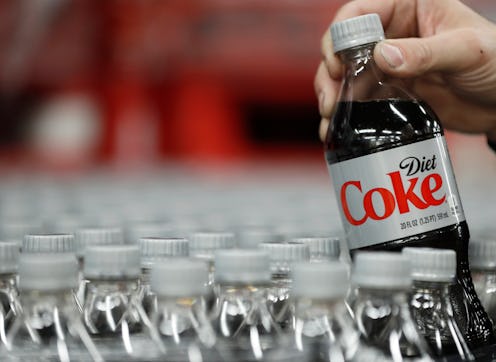We already know that most of us could probably stand to limit our sugar intake a little more than we do — but according to new research from Texas Christian University psychologist Sarah Hill and her team, diet sodas and other low-calorie, artificially sweetened drinks might not be the way to go. The study, published in the journal Appetite, showed that artificially sweetened drinks trigger cravings, but don’t satisfy them. This, in turn, leads to us consuming more sugar later, totally negating the whole point of drinking diet sodas in the first place.
Other studies have already shown that in the long term, diet drinks are associated with weight gain, rather than loss. Hill and her team wanted to look a little closer at the issue to see if they could figure out why. As such, all their experiments began with the same set-up: 115 undergraduate students were first asked to fast for at least eight hours, then drink one of three 12-ounce beverages: Sprite, which is sweetened with sugar; Sprite Zero, which is artificially sweetened; or unsweetened lemon-lime sparkling mineral water. Sprite was used instead of Coke, as it's easier to mask a clear drink than a cola-colored one; furthermore, each drink was served in an unmarked cup (although I would imagine the students were able to tell if they drank option No. 3. Unsweetened sparkling water tastes significantly different from soda).
The first experiment asked the students to perform a task on a computer after drinking their beverages: For each of 28 strings of letters flashed on a computer screen for 250 milliseconds, the students were told to push one key if the letters formed a word and different one if they didn’t. The trick, though, was this: Seven of the letter strings that formed actual words displayed the names of high-calorie foods like “cookie” and “pizza,” and seven of them displayed the names of low-calorie foods like “celery” and “carrots.” The researchers found that the undergrads who drank Sprite Zero responded more quickly to the names of the high-calorie foods — and that there was no difference in the time of response between the ones who drank regular Sprite and sparkling water.
A second experiment had the participants open a box holding a bottle of spring water, a pack of Trident sugar-free gum, and a bag of M&Ms after they drank their beverages. To disguise the actual goal of the students, the students were first asked to evaluate the logo and packaging for each product; then, at what they thought was the conclusion of the experiment, they were told they could take one of the products home with them when they left. Guess what happened? Yep — the students who drank Sprite Zero were far more likely to take the M&Ms. They were 2.93 times more likely than either the regular Sprite drinkers or the sparkling water drinkers, in fact. Wowzers.
The third experiment presented the undergrads with a couple of mini Oreos after they drank one of the three drinks. Each student was asked to eat at least one cookie, then describe how satisfied they were with that cookie. You’ve probably already figured out how that went — the ones who drank the Sprite Zero were less satisfied by the Oreos than the Sprite or sparkling water drinkers.
So why is it that the participants who drank the artificially sweetened beverage went for the sugar afterward more often than either of the other two groups? We don’t totally know yet, but the researchers theorized that it has something to do with “the decoupling of sweetness with energy availability.” Sugar gives us energy — but artificial sweeteners don’t. So, when the body tastes something sweet, it thinks it’s getting a sugary energy boost; when it gets the sweetness without the boost, though, it freaks out a little bit. This, in turns, leads it to crave the next sweet or high-calorie consumable it sees.
The moral of the story: Artificial sweeteners may be useful as a “transitional” sugar substitution if you’re trying to wean yourself off of sugary drinks, but we probably shouldn’t drink them on a regular basis. The same goes for regular soda too, of course — remember that whole thing about how Coca-Cola works as a phenomenal rust remover? Not so good for your teeth. There’s just no replacing good old water!
